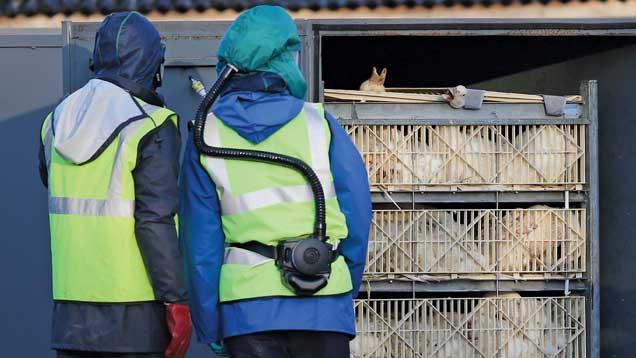Prepare for the worst with bird flu
 © Christopher Furlong /Getty
© Christopher Furlong /Getty With avian influenza making a return on a duck farm in the north-east of England, poultry producers everywhere are being urged to prepare for the worst and update their contingency plans. Poultry World provides some key pointers
What if I suspect avian influenza?
If you and your vet suspect any notifiable disease, you must tell your local Animal and Plant Health Agency (APHA) office immediately.
Google the APHA number for your region now and put it in your mobile phone.
Assuming your suspicions cannot be allayed over the phone, APHA will probably place immediate restrictions on your unit — nothing on, and nothing off. This applies to all people, vehicles, animals and agricultural products.
The rational is that, if there is sufficient cause for the agency to visit the farm, then there is good reason to take measures to prevent any spread of the disease.
How do I prepare a farm profile?
If there is a suspected outbreak on your unit it will be an incredibly stressful time for you, your staff, and your family.
There will be people on the farm investigating the disease and you will have a lot on your mind. The last thing you will want to do is sit down with someone and answer a lot of questions.
So the Animal and Plant Health Agency (APHA) suggests you prepare a Farm Profile now which paints a picture of your business. Your description will be used to help all the scientists, policy-makers and veterinary officers who have to make decisions about the suspected outbreak on your farm.
In your Farm Profile, which will need updating periodically, APHA would like you to answer the following questions:
- The location of your business
- Number of sites and their location
- What do you do — e.g. broiler breeder, egg producers, turkey farmer
- How many birds you have on site
- Where you get your chicks/pullets
- When, how and where you move birds
- Number of employees
- Layout of the site
- Any contractor details
- Disease history
- Any relevant production issues
- Vaccinations and other health treatments
- Cull and deadstock handling arrangements
- Vet contact details
- Biosecurity protocols
Having taken your call, and having informed Defra’s disease unit, APHA will dispatch a veterinary officer immediately and he or she will get to your farm as soon as possible.
The veterinary officer will then examine your suspect birds and will also look round the rest of the farm as it is important, with an exotic disease, to build a picture of everything that is happening.
At this stage it is possible that, based on the clinical signs, the movement restrictions can be lifted and the case closed.
If the case cannot be closed, APHA aims for a proportionate response, based on the available information. Defra, scientists and APHA strategists will hold an amber telephone conference and the EU Commission will be informed about what is happening. Early reporting generates trust and ensures the UK maintains its reputation for being open and trustworthy as far as disease reporting is concerned.
Also, at this stage, APHA may start tracing any bird movements in case tests are positive and standstills have to be imposed.
How long before test results come back?
Generally, the first useful test results are available within 24 hours, with final confirmation within 72 hours. But it may be six to 10 days before the labs can give an all-clear, as it is easier to confirm a disease than to negate it.
What happens if the tests are positive?
If avian flu is confirmed, the movement restrictions on the farm will be widened, to include a 3km Protection Zone and a 10km Surveillance Zone. All farms within the PZ will be inspected and placed under movement restrictions. Livestock within the SZ will also be subject to movement restrictions.
Activity to trace bird movements will be ramped up and culling will start.
The most effective action that can be taken to control a viral disease is to kill infected and exposed birds as soon as possible, whereupon the virus starts to die.
Trade restrictions will be put in place immediately. Other activities will include disposal of carcases, and the UK will formally brief the EU and World Organisation for Animal Health.
In time, some movement licences may be issued based on a risk assessment.
How do I prepare a contingency plan?
What would happen if your unit were to be shut down for a week in a suspected outbreak? APHA recognises the difficulties, but urges all poultry keepers to prepare a contingency plan, covering the following:
Key messages from APHA
- Produce a farm profile so that APHA can quickly understand your business
- Don’t be afraid to ask APHA for advice
- Keep accurate movement records
- Keep a visitor book
- Add APHA to your phone contacts
- Erect security notices around the farm
• Build-up of stock, such as eggs and manure
• Bird housing
• Feed supplies
• Bedding
• Drainage
• Family members
• Employees
The above report is based on advice on preparing for notifiable diseases issued by the National Pig Association and the NFU
